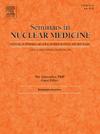Artificial intelligence for tumor [18F]FDG-PET imaging: Advancement and future trends—part I
IF 5.9
2区 医学
Q1 RADIOLOGY, NUCLEAR MEDICINE & MEDICAL IMAGING
引用次数: 0
Abstract
The advent of sophisticated image analysis techniques has facilitated the extraction of increasingly complex data, such as radiomic features, from various imaging modalities, including [18F]FDG PET/CT, a well-established cornerstone of oncological imaging. Furthermore, the use of artificial intelligence (AI) algorithms has shown considerable promise in enhancing the interpretation of these quantitative parameters. Additionally, AI-driven models enable the integration of parameters from multiple imaging modalities along with clinical data, facilitating the development of comprehensive models with significant clinical impact.
However, challenges remain regarding standardization and validation of the AI-powered models, as well as their implementation in real-world clinical practice. The variability in imaging acquisition protocols, segmentation methods, and feature extraction approaches across different institutions necessitates robust harmonization efforts to ensure reproducibility and clinical utility. Moreover, the successful translation of AI models into clinical practice requires prospective validation in large cohorts, as well as seamless integration into existing workflows to assess their ability to enhance clinicians’ performance.
This review aims to provide an overview of the literature and highlight three key applications: diagnostic impact, prediction of treatment response, and long-term patient prognostication. In the first part, we will focus on head and neck, lung, breast, gastroesophageal, colorectal, and gynecological malignancies.
人工智能在肿瘤中的应用[18]FDG-PET成像:进展与未来趋势(一)。
复杂的图像分析技术的出现促进了从各种成像方式中提取越来越复杂的数据,如放射学特征,包括[18F]FDG PET/CT,这是肿瘤成像的一个完善的基石。此外,人工智能(AI)算法的使用在增强这些定量参数的解释方面显示出相当大的希望。此外,人工智能驱动的模型可以将多种成像模式的参数与临床数据集成在一起,促进具有重大临床影响的综合模型的开发。然而,在人工智能模型的标准化和验证以及在现实世界的临床实践中实施方面,挑战仍然存在。不同机构的成像采集协议、分割方法和特征提取方法的可变性需要强有力的协调工作,以确保可重复性和临床实用性。此外,将人工智能模型成功转化为临床实践需要在大型队列中进行前瞻性验证,并无缝集成到现有工作流程中,以评估其提高临床医生绩效的能力。本综述旨在提供文献综述,并强调三个关键应用:诊断影响、治疗反应预测和患者长期预后。在第一部分中,我们将重点关注头颈部、肺部、乳房、胃食管、结肠直肠和妇科恶性肿瘤。
本文章由计算机程序翻译,如有差异,请以英文原文为准。
求助全文
约1分钟内获得全文
求助全文
来源期刊

Seminars in nuclear medicine
医学-核医学
CiteScore
9.80
自引率
6.10%
发文量
86
审稿时长
14 days
期刊介绍:
Seminars in Nuclear Medicine is the leading review journal in nuclear medicine. Each issue brings you expert reviews and commentary on a single topic as selected by the Editors. The journal contains extensive coverage of the field of nuclear medicine, including PET, SPECT, and other molecular imaging studies, and related imaging studies. Full-color illustrations are used throughout to highlight important findings. Seminars is included in PubMed/Medline, Thomson/ISI, and other major scientific indexes.
 求助内容:
求助内容: 应助结果提醒方式:
应助结果提醒方式:


